All-in-one ETFs by Vanguard, iShares, BMO, Horizons, TD, and other ETF providers have made investing much cheaper and easier for Canadian investors, whether you are experienced or just starting your investment journey.
Exchange-Traded Funds (ETFs) sales continue to grow in Canada, with net sales keeping pressure on and exceeding mutual funds sales last year.
This is not surprising. As I have been saying for a while, Canada’s expensive mutual funds (one of the highest in the developed world) and less-than-stellar active management performance will eventually face a day of reckoning.
While we are not there yet, that day is closer than ever, and the Big Banks are starting to notice.
This article covers some of the best all-in-one ETFs you can hold in your investment portfolio this year.
Best All-in-One ETF Portfolios in Canada
Vanguard pioneered all-in-one asset allocation ETFs in Canada and has been closely followed by the other major ETF providers – iShares, BMO, and Horizons.
These all-in-one low-cost ETF portfolios serve as a fund of funds, each built using several underlying ETFs and essentially serving as a basket for tens of thousands of securities. They are pre-designed to satisfy investors with varying risk profiles.
These complete portfolios make it extremely easy to hold a diversified portfolio as a do-it-yourself investor and not worry about re-balancing or high management fees. Simply ‘set it and (almost) forget it.’
You can easily buy all-in-one ETFs in Canada using trading platforms like Qtrade and Questrade.
Vanguard All-in-One ETFs
Vanguard is one of the largest investment companies in the world, with more than $8.5 trillion USD in assets under management. It was also the first ETF provider to bring asset allocation ETFs to Canada.
The 6 Vanguard all-in-one ETFs are:
1. Vanguard Conservative Income ETF Portfolio (VCIP): This portfolio seeks to provide a combination of income and some long-term capital growth by investing in equity and fixed-income securities. It is made up of 7 underlying Vanguard ETFs.
- Asset allocation: 80% fixed income and 20% equity
- Management fee: 0.22%
- MER: 0.24%
2. Vanguard Conservative ETF Portfolio (VCNS): Seeks to provide a combination of income and moderate long-term capital growth. It is made up of 7 underlying ETFs.
- Asset allocation: 60% fixed income and 40% equity
- Management fee: 0.22%
- MER: 0.24%
3. Vanguard Balanced ETF Portfolio (VBAL): Seeks to provide long-term capital growth with a moderate income level. It consists of 7 underlying Vanguard ETFs.
- Asset allocation: 60% equity and 40% fixed income
- Management fee: 0.22%
- MER: 0.24%
4. Vanguard Growth ETF Portfolio (VGRO): Seeks to provide long-term capital growth. It consists of 7 underlying Vanguard ETFs.
- Asset allocation: 80% equity and 20% fixed income
- Management fee: 0.22%
- MER: 0.24%
5. Vanguard All-Equity ETF Portfolio (VEQT): Seeks to provide long-term capital growth and consists of 4 underlying ETFs.
- Asset allocation: 100% equity
- Management fee: 0.22%
- MER: 0.24%
6. Vanguard Retirement Income ETF Portfolio (VRIF): This portfolio seeks to provide consistent income to retirees and consists of 8 underlying ETFs.
- Asset allocation: 50% equity and 50% fixed income
- Management fee: 0.29%
- MER: 0.32%
BlackRock is a leader in the ETF marketplace in Canada, with more than $275 billion in assets under management. The five iShares asset allocation ETFs are:
1. iShares Core Income Balanced ETF Portfolio (XINC): Seeks to provide long-term capital growth and income and comprises 8 underlying iShares ETFs.
- Management fee: 0.18%
- MER: 0.20%
- Asset allocation: 20% equity and 80% fixed income
2. iShares Core Conservative Balanced ETF Portfolio (XCNS): Like XINC, this ETF portfolio seeks to provide long-term capital growth and income, but it does so with a higher stock component. It is made up of 8 underlying iShares ETFs.
- Management fee: 0.18%
- MER: 0.20%
- Asset allocation: 40% equity and 60% fixed income
3. iShares Core Balanced ETF Portfolio (XBAL): Seeks to provide long-term capital growth and income and comprises 8 underlying iShares ETFs.
- Management fee: 0.18%
- MER: 0.20%
- Asset allocation: 60% equity and 40% fixed income
4. iShares Core Growth ETF Portfolio (XGRO): Seeks to provide long-term capital growth and comprises eight underlying iShares ETFs.
- Management fee: 0.18%
- MER: 0.20%
- Asset allocation: 80% equity and 20% fixed income
5. iShares All-Equity ETF Portfolio (XEQT): Seeks to provide long-term capital growth and comprises four underlying ETFs.
- Management fee: 0.18%
- MER: 0.20%
- Asset allocation: 100% equity
BMO All-in-One ETFs
The Bank of Montreal is another major ETF provider with more than five asset allocation ETF portfolios in its stable, including ESG-themed ones.
1. BMO Conservative ETF (ZCON): Seeks to provide income and moderate long-term capital appreciation and consists of 7 underlying BMO ETFs.
- MER: 0.20%
- Asset allocation: 60% fixed income and 40% equity
2. BMO Balanced ETF (ZBAL): Seeks to provide moderate long-term capital appreciation and income. It is made up of 7 underlying BMO ETFs.
- MER: 0.20%
- Asset allocation: 60% equity and 40% fixed income
3. BMO Growth ETF (ZGRO): Seeks to provide long-term capital appreciation and is also made up of 7 underlying BMO ETFs.
- MER: 0.20%
- Asset allocation: 80% equity and 20% fixed income
4. BMO All-Equity ETF (ZEQT): This ETF portfolio seeks to provide equity growth and long-term capital appreciation and is also made up of 6 underlying BMO ETFs. It has a medium risk rating.
- MER: 0.20%
- Asset allocation: 100% equity
5. BMO Monthly Income ETF (ZMI): This ETF portfolio is designed for investors seeking higher yields. It comprises 8 BMO ETFs and has a low-medium risk rating.
- MER: 0.20%
- Asset allocation: 60% equity and 40% fixed income
Horizons All-in-One ETFs
1. Horizons Balanced Tri ETF Portfolio (HBAL): This one-ticket solution portfolio seeks long-term capital growth. It currently holds 8 underlying Horizons ETFs.
- MER: 0.16%
- Asset allocation target: 70% equity and 30% fixed income
2. Horizons Conservative Tri ETF Portfolio (HCON): Seeks moderate long-term capital growth and comprises 8 underlying Horizons ETFs.
- MER: 0.15%
- Asset allocation target: 50% equity and 50% fixed income
3. Horizons Growth Tri ETF Portfolio (HGRO): Seeks long-term capital growth and comprises 5 underlying Horizons ETFs.
- MER: 0.16%
- Asset allocation target: 100% equity
TD All-in-One ETFs
TD’s three all-in-one ETFs were recently revamped. They are offered with a low competitive management fee of 0.15%:
- TD Conservative ETF Portfolio (TCON): 70% fixed income and 30% equity
- TD Balanced ETF Portfolio (TBAL): 40% fixed income and 60% equity
- TD Growth ETF Portfolio (TGRO): 10% fixed income and 90% equity
Fidelity All-in-One ETFs
Fidelity recently joined the list of ETF providers offering asset allocation ETFs with the following:
- Fidelity All-in-One Conservative ETF (FCNS): 59% fixed income, 40% equity, and 1% crypto
- Fidelity All-in-One Balanced ETF (FBAL): 39% fixed income, 59% equity, and 2% crypto
- Fidelity All-in-One Growth ETF (FGRO): 15% fixed income, 82% equity, and 3% crypto
- Fidelity All-in-One Equity ETF (FEQT): 97% equity and 3% crypto
I generally like all the one-ticket solution ETFs provided by the major ETF providers in Canada.
While I tend to be biased in favour of Vanguard, given their historical leadership when it comes to providing everyday investors with cost-saving opportunities in the financial markets, the others are just as good, in my opinion.
In fact, iShares, BMO, and Horizons are currently beating Vanguard slightly on fees by up to 10 basis points (0.10%). It’s not much, but it’s worth noting for the cost-conscious investor.
There are also some subtle differences between the portfolio offerings offered by these providers.
For example, Vanguard’s fixed income consists of U.S., Canada, and international bonds, whereas for iShares, the fixed income component only consists of U.S. and Canadian bonds. You will also find some variations in how the different providers allocate their share of Canadian, U.S., and international equities.
Horizons uses a type of derivative (swaps) as part of the investment strategy for its one-ticket ETF offerings.
All the aforementioned all-in-one ETF portfolios are re-balanced to keep their asset allocation within the target range. For example, BMO re-balances quarterly, while Horizons does it semi-annually.

How To Invest in Canada and Save on Fees
To cut investment fees, investors can follow one or a combination of options:
1. Do-it-yourself investing
DIY completely by using a discount brokerage account to purchase individual stocks, low-cost all-in-one ETFs, etc.
This option requires that you are comfortable allocating assets inside your portfolio to match your risk tolerance and investment objectives. It also requires you to be willing /able to re-balance your portfolio as required from time to time.
With the advent of all-in-one ETF portfolios, it has never been easier to jump on the do-it-yourself investing bandwagon.
Low-cost to no-fee brokerage platforms in Canada include Questrade, Moomoo and Qtrade.
Questrade

Trade stocks, ETFs, options, FX, bonds, CFDs, mutual funds, etc.
Get $50 trade credit with $1,000 funding
Low and competitive trading fees
No quarterly inactivity fees
Access to advanced tools and trading data
Top platform for advanced traders
Transfer fees waived
Qtrade

Up to $150 sign-up bonus
Trade stocks, ETFs, options, bonds, etc.
Excellent platform for newbies and seasoned investors
Competitive trading fees
Excellent customer service
Moomoo

Trade stocks, ETFs, options, etc.
Up to $2,400 in welcome bonuses
Very low competitive trading fees
Free Level 2 data and access to paper trading to test strategies
Earn interest on uninvested cash
No monthly or quarterly fees
2. Use a robo-advisor
These online wealth managers use low-cost ETFs and do all the work for you, so there’s no need to fret over portfolio diversification or re-balancing. In exchange, they charge a management fee.
The management fee you pay to a robo-advisor is significantly lower than the fee you pay for comparable mutual funds at your bank.
When you open a new account, robo-advisors ask you some questions to determine your risk tolerance, time frame, and investment objectives. You can update your preferences later if required and can also easily set up automatic contributions to your account.
Compare Canada’s Best Robo-Advisors.
Investment fees are not the be-all and end-all of investing. However, they are very important, especially when you realize that active mutual fund managers rarely live up to their hype, and the investment returns that matter to you, in the long run, are ‘net’ of fees.
One of Canada’s most popular online wealth managers, Questwealth, offers our readers a bonus when they open an account.
What is an ETF and Why Should You Use Them?
An ETF is similar to a mutual fund in that it is a basket of securities that tracks a market index. Unlike mutual funds, however, the market price of an ETF fluctuates during the trading session, similar to stocks (Equity), and they are bought and sold on an exchange at the market price.
Broadly, there are two types of ETFs – passive and actively managed.
Index (passive) ETFs attempt to replicate the performance of the broad index they are tracking, e.g. S&P 500, while active ETFs are similar to mutual funds and aim to beat the market. The low-cost ETFs discussed in this post are index-style ETFs for the most part.
Here are more details on ETFs.
Some of the core benefits of ETFs include:
1. Lower Fees: The management expense ratio (MER) charged by ETFs is much lower than mutual funds, with annual costs as low as 0.06% compared to up to 2% or more for the average equity mutual fund. Over time, lower fees may translate into higher returns.
2. Diversification: An ETF can hold hundreds to thousands of stocks, bonds, commodities, currencies, and real estate globally, providing investors with diversification across asset classes and Geo-locations.
They also come with some downsides:
1. Trading fees: If you are an investor hoping to purchase a few ETFs monthly to add to your portfolio, the transaction fees can add up. There are now options to purchase commission-free ETFs in Canada, so this is no longer a big issue.
That being said, frequent small-size trading using an online discount brokerage that charges commissions on either the buy or sell side can easily wipe out the savings from lower MERs.
2. Re-balancing: Unless you are using a robo-advisor or all-in-one ETF, you will need to re-balance your portfolio 1-2 times a year when the asset allocation significantly strays from its desired target due to variations in price fluctuation for different assets.
Conclusion
Successful investing can be all about your costs. Over time, investment fees can significantly erode your returns and negatively impact your retirement savings.
All-in-one ETF portfolios are already designed to fit the different spectrums of investors’ risk appetites, and you can easily switch between funds if your financial situation changes.
Questrade offers access to various investment products, including stocks, ETFs, options, FX trading, IPOs, precious metals, GICs, and more. And, when you open a new account and deposit $1,000 or more, you get free trade credits worth $50.
If you’d instead not get your hands dirty with DIY investing, you can still enjoy the benefits of low-cost ETF investing by using one of Canada’s best robo-advisors, Questwealth, and get no-fee investing for one year (on up to $10,000).
Related Reading:

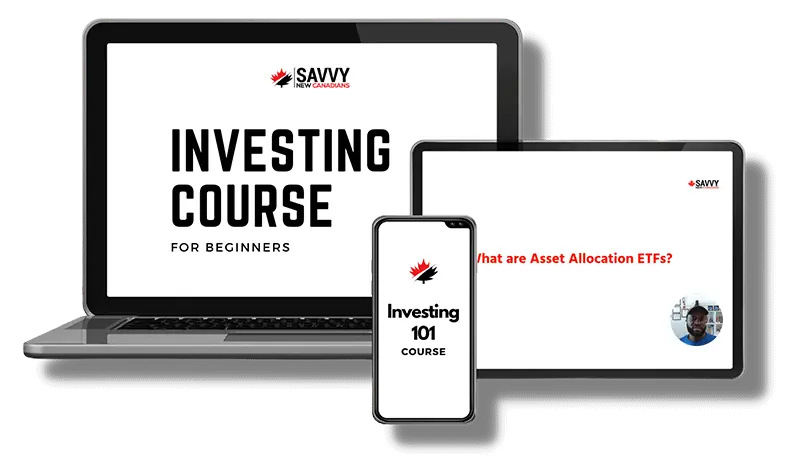
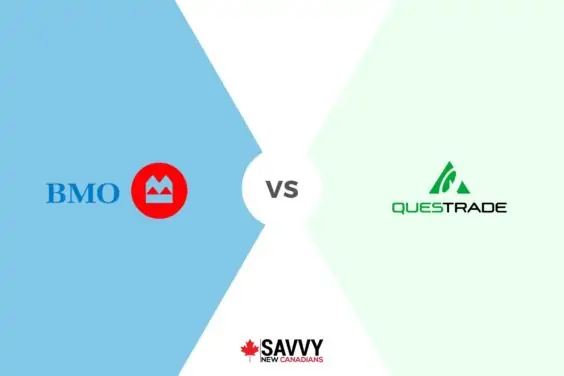
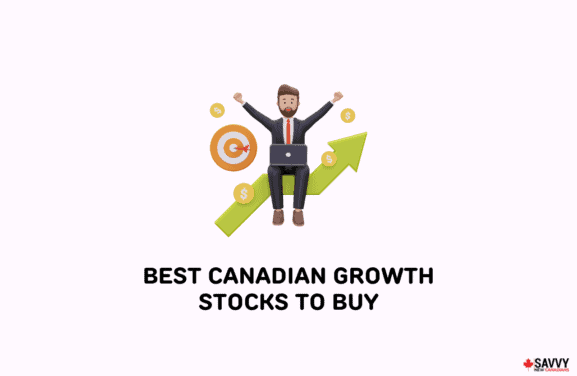
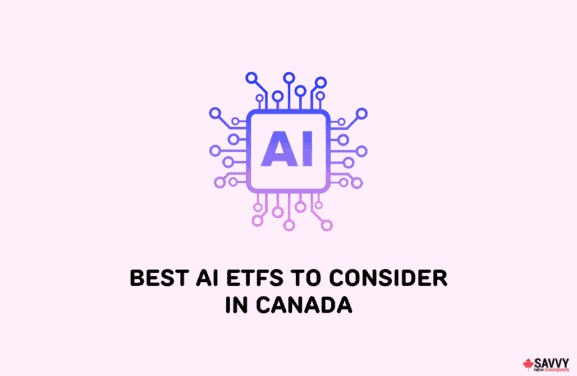

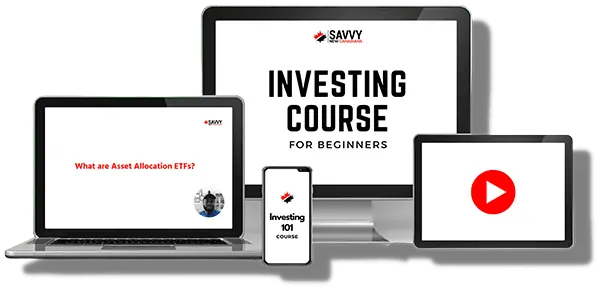

Hi, great content as always. Can one invest in mutual funds via TFSA/RSP and also invest in ETFs for diversification?
You said, in point 1 above about trading fees, that “If you are an investor hoping to purchase a few ETFs monthly to add to your portfolio, the transaction fees can add up..” does this apply even when Wealthsimple is used?
Apologies if the answers to my questions are obvious.
Thanks.
Ror
@Ror: No. With Wealthsimple Invest, you can make regular deposits and they will invest them on your behalf. Your management fee does not change. If you choose to DIY and buy the ETFs individually yourself using Wealthsimple Trade, you also get free trades for Canadian ETFs.
Hi, I read your post at https://www.savvynewcanadians.com/guide-to-robo-advisors-canada-and-comparison/ and I was wondering if one could do both active investing (using banks or other FIs for mutual funds) and also robo-advisors (passive investing on ETFs)? I don’t know if my question makes sense.
I currently do active investing buying mutual funds with an FI (think it might include ETFs but im not entirely sure) and i believe the MER is much > 1%. Having read your post, I think i’d like to do passive investment with low MER fees using robo-advisors like Wealthsimple etc.
Can you have both passive and active or just one or the other?
Thanks
Ror
@Ror: Yes, you can do both. This is also one way to test passive investing if you are not fully sold on it yet.
Great write up for beginner investors! I also love the comparison near the end of the article. Thank you for sharing all your knowledge. Really appreciate it.
Hi Enoch,
Great column! Just wanted to add that TD updated its suite of all-in-one ETFs in September, which now have new names and tickers replacing the former One Click portfolios mentioned above, making them much more competitive with Vanguard, et al.
They scrapped all the “fancy” thematic holdings replacing them with 4 of TD’s low cost index funds TDB (Cdn bond), TTP (Cdn Equity), TPE (Int’l Developed Equity), and TPU (US Equity). management fee is 0.15% and total MER was estimated by Rob Carrick to be around 0.18%, making these (I think) the cheapest all-in-ones in Canada. See:
https://stories.td.com/ca/en/news/2023-09-01-td-asset-management-inc.-streamlines-suite-of-all-in-one-td#:~:text=The%20changes%2C%20announced%20July%2028,one%20ETF%20portfolios%20in%20Canada
https://www.theglobeandmail.com/investing/personal-finance/carrick-on-money/article-the-best-little-investment-in-canada-grows-up-and-gets-cheaper/
@Anthony: Thanks for bringing my attention to this. The new ETFs are very competitive!